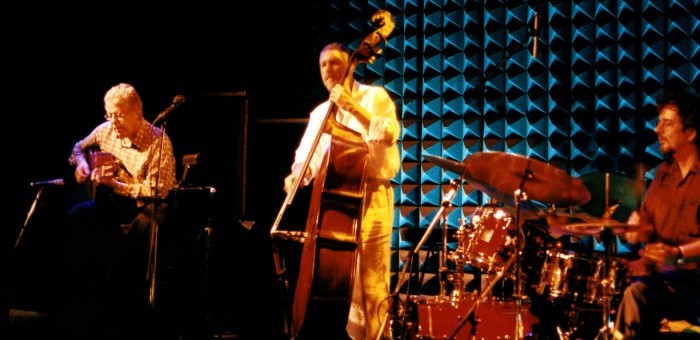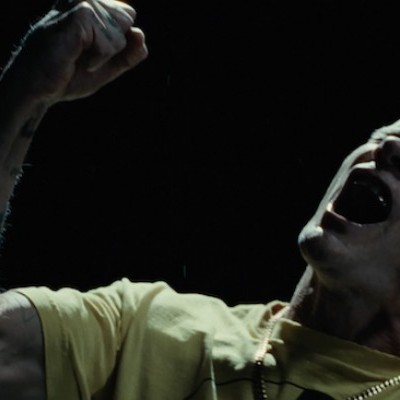Dec 9, 2025 12:28 PM
In Memoriam: Gordon Goodwin, 1954–2025
Gordon Goodwin, an award-winning saxophonist, pianist, bandleader, composer and arranger, died Dec. 8 in Los Angeles.…

Trio da Paz: Romero Lubambo (left), Nilson Matta and Duduka da Fonseca
(Photo: Courtesy of the Artists)As they approached their 30th anniversary playing together, the members of Trio da Paz—the Brazilian jazz supergroup composed of guitarist Romero Lubambo, bassist Nilson Matta and drummer Duduka da Fonseca—decided to go into the studio. It was a relatively rare event.
The album, which they titled 30 (Zoho), is only the trio’s seventh release. The musicians pondered how best to celebrate their longevity. They could have chosen to make a retrospective of the songs that made them the best-known trio in Brazilian jazz, or an album featuring some of the jazz and Brazilian music legends with whom they have recorded in the past; maybe both.
They opted instead to make an artistic statement that was both simple and bold: no guest stars, no recitation of past glories, just the three of them playing new tunes, mostly originals, live in the studio. The result is a portrait of a guitar-based trio still making vital, highly personal music that fuses Brazilian tradition with progressive American jazz.
The album, featuring four originals by Lubambo, three by Matta and two by da Fonseca, represents a new high-water mark for the group, as well as its first Grammy nomination, in the category of Best Latin Jazz album.
But these three musicians are no strangers to the Grammys. Each has been previously cited by the Recording Academy: Lubambo for his work with Dianne Reeves, Angélique Kidjo, and Luciana Souza, among others; Matta as part of projects with Joe Henderson, Nancy Wilson, Yo-Yo Ma and The Brazilian Trio (his other trio, with pianist Helio Alves and da Fonseca); and da Fonseca for his 2002 solo album Samba Jazz Fantasia, and as part of The Brazilian Trio.
DownBeat caught up with Lubambo and Matta at New York City’s Café Loup and spoke with drummer da Fonseca the next day via Skype from Rio de Janeiro.
Congratulations on the Grammy nomination for your album, 30.
Nilson Matta: Thanks. The nomination means a lot to us. We didn’t expect it.
Romero Lubambo: It’s great to have that recognition for 30 because this album is very much about what we are as a trio. We weren’t thinking about the industry. We just went into the studio and played the way we play onstage. We didn’t over-produce anything.
NM: Yes, it was all first takes … no fixes. It’s very honest music.
How often does the band rehearse?
NM: We never rehearse. I think the last time was 30 years ago, when we first got together in Duduka’s basement just to play. Romero and I had recently arrived [in the United States] and Duduka invited us to his place to have dinner. It wasn’t our idea to start a trio. That came later.
This album celebrates the 30th anniversary of Trio da Paz. That’s longer than many marriages last—and certainly far longer than most jazz groups do. What’s your secret for staying together?
RL: I think it’s the fact that we are not only doing Trio da Paz. I do my things, and Nilson does his projects, and Duduka has his groups. It doesn’t get tired because we all play other things, then we come back together and it feels like something special and important and fresh. I think marriages would probably last longer if you had that “pause” also.
NM: What makes the group work is that we are three different personalities. When we play we have a certain chemistry, and we become just one personality: the trio.
Duduka da Fonseca: It wouldn’t be the same with any other players. We decided that never, ever, would we allow a sub in Trio da Paz. If one of us can’t make a gig, we might play, but we won’t use the name Trio da Paz.
How did the group first form?
DDF: I moved to New York from Rio at the end of 1975. At that time, bossa nova and Brazilian music had mostly vanished from the city. So myself and a handful of musicians worked really hard to rebuild the Brazilian jazz scene in New York. In 1980, I got a gig with Astrud Gilberto, and formed the New York Samba Band [which eventually included Matta and Lubambo] and the Brazilian Express. In 1983, I visited Rio and reconnected with Nilson; we used to play soccer sometimes in a musicians’ game. It was then that I also met Romero and heard him play. I encouraged them both to come to New York, which they did two years later in 1985.
RL: Duduka was very open and nice. He helped us a lot, because he was already established here and knew everybody. He introduced me to Astrud Gilberto, and I joined her band and was with her for four years. That was the beginning of everything for me. Then Herbie Mann heard the three of us playing in the New York Samba Band. He hired us to become his rhythm section, and we toured all over the world with him for years.
Who were your role models or influenced your sound as an instrumental trio?
NM: Nobody. Individually, we have many influences; for me it was people like Mingus, Scott LaFaro and Ron Carter, and in Brazil, Luizão Maia and José Alves. But I never heard any group that sounds like us.
RL: There were lots of famous Brazilian piano trios, like the Tamba Trio and the Zimbo Trio. But I can’t think of a single Brazilian guitar trio. I knew great Brazilian guitar players, like Baden Powell and Bola Sete. But our sound is just us.
(For info on the album 30, visit the Zoho Music website. For more info on Trio Da Paz, visit the band’s website.) DB

Goodwin was one of the most acclaimed, successful and influential jazz musicians of his generation.
Dec 9, 2025 12:28 PM
Gordon Goodwin, an award-winning saxophonist, pianist, bandleader, composer and arranger, died Dec. 8 in Los Angeles.…

Belá Fleck during an interview with Fredrika Whitfield on CNN.
Jan 13, 2026 2:09 PM
The fallout from the renaming of the John F. Kennedy Center for the Performing Arts to include President Donald…

The success of Oregon’s first album, 1971’s Music Of Another Present Era, allowed Towner to establish a solo career.
Jan 19, 2026 5:02 PM
Ralph Towner, a guitarist and composer who blended multiple genres, including jazz — and throughout them all remained…

Flea has returned to his first instrument — the trumpet — and assembled a dream band of jazz musicians to record a new album.
Dec 2, 2025 2:01 AM
After a nearly five-decade career as one of his generation’s defining rock bassists, Flea has returned to his first…

Rico’s Anti-Microbial Instrument Swab
Jan 19, 2026 2:48 PM
With this year’s NAMM Show right around the corner, we can look forward to plenty of new and innovative instruments…